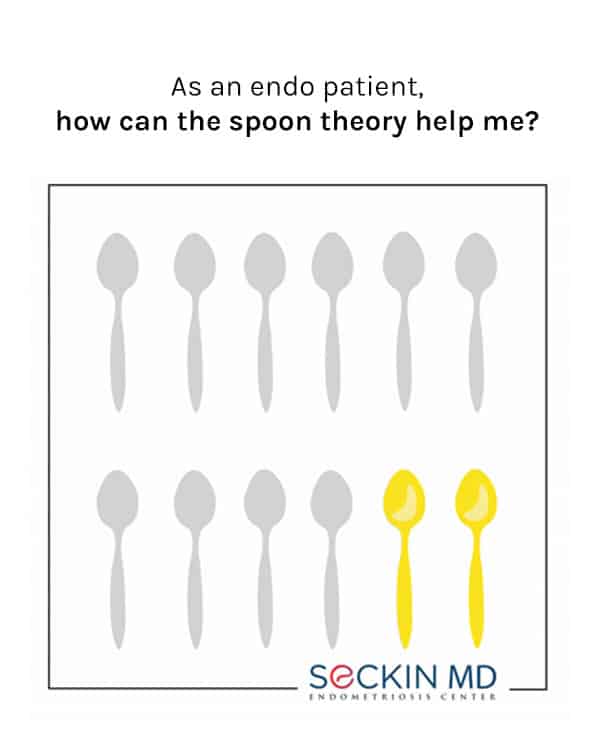The Spoon Theory for Endometriosis Patients

Those who have endometriosis may also experience chronic pain and fatigue, which means that the patient has a limited amount of energy to perform daily activities. It is often difficult to understand the challenge that endometriosis patients are facing that otherwise seem healthy and appear well. The spoon theory is a good way to explain your condition and daily life challenges.
What is it?
The spoon theory came into being when a friend asked Christine Miserandino, a lupus patient, what it was living with a chronic disease.
She explained that a patient with a chronic disease has only a limited amount of energy each day. She referred to this as having a set number of ‘spoons’ per day.
In contrast to healthy individuals who have adequate energy (or perhaps an infinite number of ‘spoons’), patients living with a chronic disease have a limited number of ‘spoons’. And they need to use wisely, little by little, for different activities.
Small activities such as brushing teeth or dressing may take up one or two ‘spoons’. More energy-demanding activities such as traveling to work or preparing dinner may take up a greater number of ‘spoons’. This means that the patient must prioritize and plan their activities during the day. This is because performing a more energy-demanding activity at the beginning of the day may mean compromising other activities for the rest of the day. When they’ve used up all their ‘spoons’, the person has no energy left to perform any activities.
The spoon theory needs to be adjusted for each individual. Some may start the day with greater energy while others may already be out of energy when they wake up. There are only a limited number of ‘spoons’ or energy available each day. If a patient goes beyond the set number of ‘spoons’ for a day, they have fewer ‘spoons’ left for the next day.
How can the spoon theory help me?
The spoon theory is a great way to describe the constant and debilitating fatigue that you may be experiencing.
Family, friends, or colleagues can better understand your needs and challenges if you explain your limited energy reserve using the spoon theory. It could also help them be prepared for situations when you’ve exhausted all your ‘spoons’. This could reduce the stress that you experience when people around you think you are healthy while you are actually out of energy.
The spoon theory can also help you become more conscious and mindful of your energy reserves. This way, you may use your limited number of ‘spoons’ more efficiently by planning and prioritizing your daily activities.
For example, you can plan your meals or prepare them ahead of time. This may be helpful when you come home with fewer ‘spoons’ left at the end of the day.
You could also plan your week by distributing energy-demanding activities such as social outings on less hectic days. It is always best to let your own body determine when it is out of energy for a day.
Another way to efficiently use your ‘spoons’ could be to change the routine that is normally exhausting for you. For example, consider using a grocery delivery service instead of shopping yourself. It can also help if you perform certain activities in a less tiring way. For example, you could use a chair while you are brushing your teeth, cooking, or bathing.
You could also distribute your ‘spoon’ usage for hectic tasks during the week by breaking them into smaller, less-tiring tasks.
If you have used up all your ‘spoons’ from the previous days, it could be helpful to set aside one day during the week for rest if possible.
Get a Second Opinion
Our endometriosis specialists are dedicated to providing patients with expert care. Whether you have been diagnosed or are looking to find a doctor, they are ready to help.Our office is located on 872 Fifth Avenue New York, NY 10065.
You may call us at (646) 960-3080 or have your case reviewed by clicking here.